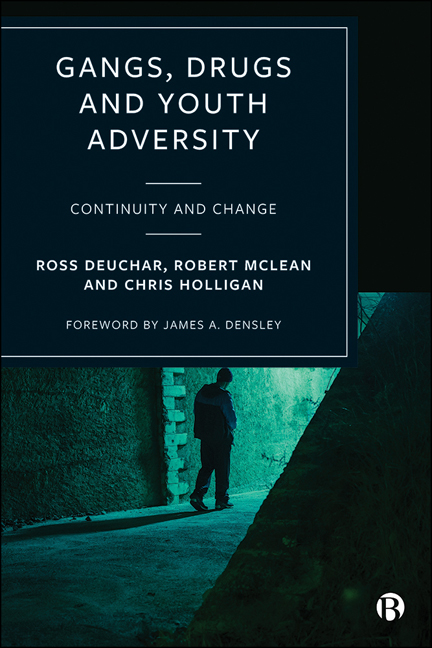Book contents
3 - Transitional Journeys and Contemporary Adversity: Practitioner Insights
Published online by Cambridge University Press: 13 May 2022
Summary
In this part of the book, we present the insights from our qualitative research fieldwork. In so doing, we revisit the phenomena of street gangs, weapon-carrying and violence in communities in the west of Scotland, more than a decade on from Deuchar's original work, and explore wider contemporary challenges impacting young people.
We begin in this chapter by examining the way a public health approach to violence prevention has been put in place in Scotland over the last 10–15 years and has had a particular focus on addressing the social determinants of gang violence and weapon-carrying. We share initial insights from our interviews with practitioners in and around Glasgow to present case study illustrations of pioneering and high- profile projects and initiatives associated with the SVRU as well as complementary educational and youth outreach initiatives. Drawing on these insights, and as a prelude to the wider discoveries from former gang members, adults and young people that we present in subsequent chapters in this section of the book, we suggest that these interventions have contributed to the alleged decline in gang violence. However, we also draw on practitioners’ perspectives to begin to suggest that entrenched systemic issues such as poverty and social inequality may be throwing up an intersection of wider adversities for disadvantaged youth.
A public health approach to violence prevention
The public health approach to violence and its prevention was set out by the World Health Organization (WHO), a specialised agency of the United Nations responsible for promoting international health and wellbeing, in 2002 in its ‘World report on violence and health’ (Conaglen and Gallimore, 2014). The approach moves the focus from dealing with the consequences of violence to preventing violence through ‘addressing its causes’ (Conaglen and Gallimore, 2014, p 15). Key elements of the approach are: defining and monitoring of the extent of the problem; identification of its causes; developing and testing means of dealing with or resolving the problem; and wider-scale implementation of measures that are found to work (Conaglen and Gallimore, 2014; Batchelor et al, 2019).
One important public health approach to conceptualising risk factors is the ‘highly influential’ Adverse Childhood Experiences (ACEs) study, which was undertaken in partnership with the Centre for Disease Control in the United States (Batchelor et al, 2019, p 14).
- Type
- Chapter
- Information
- Gangs, Drugs and Youth AdversityContinuity and Change, pp. 37 - 59Publisher: Bristol University PressPrint publication year: 2021



